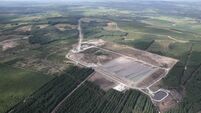When life changes forever: Three Ukrainian women describe harrowing journey to Ireland

Olga Yurkiv with her 18-month-old daughter on an excursion in Bray; they had to leave their home in Rivne in Ukraine when war broke out.
Larisa Khokhuda lives in Kinvara's Merriman Hotel.
Anna Makarenko lives in Limerick's George Hotel.













